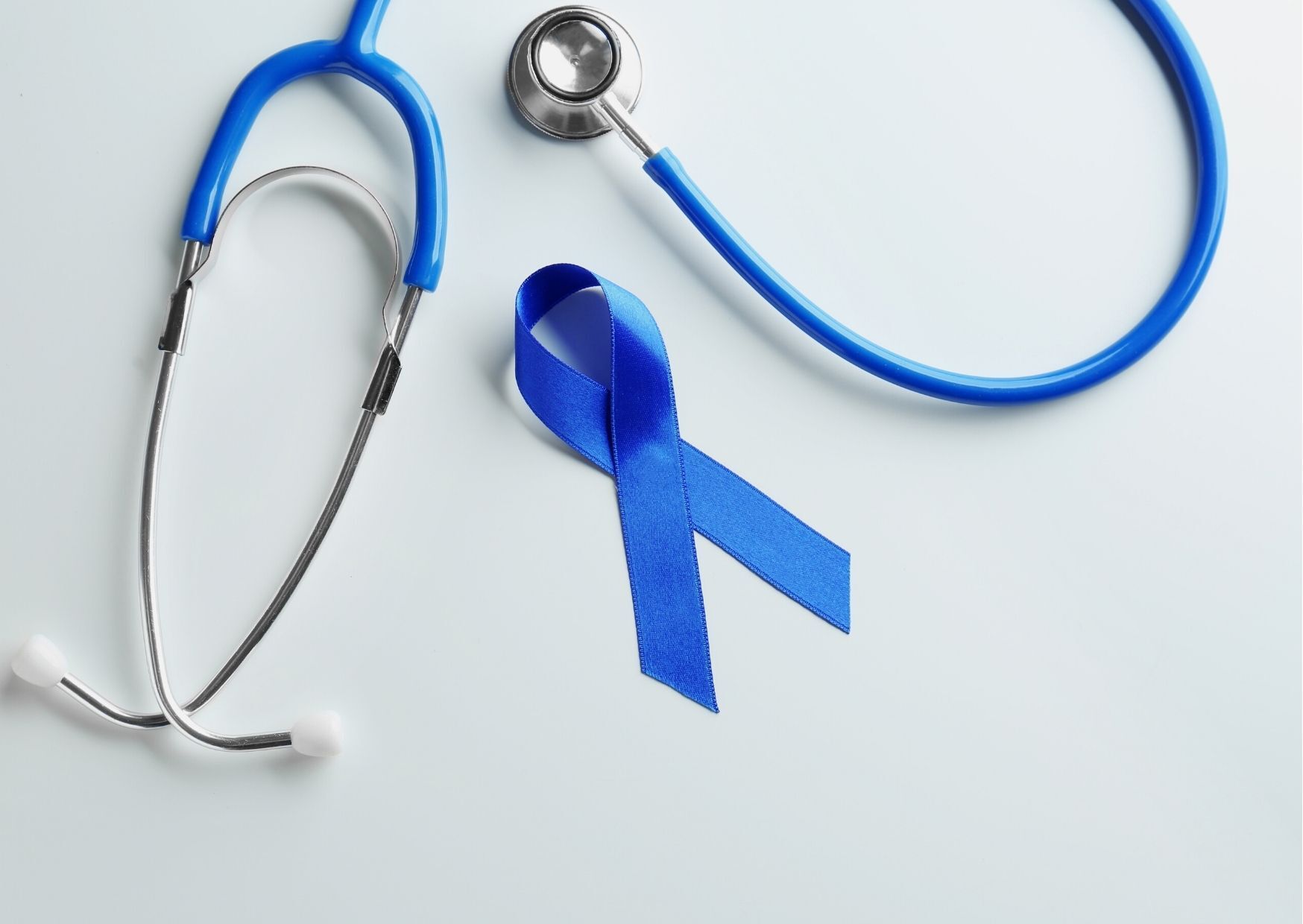Colorectal Cancer Awareness : The Importance of Screenings

Colorectal cancer is the third most common cancer diagnosed in both men and women in the United States. In addition, it is the third leading cause of cancer deaths in both men and women. While most cases of colorectal cancer occur in people over the age of 50, the disease can strike men and women of any age.
The best part is that regular colorectal screenings can not only detect colorectal cancer early – making it much easier to treat – but can also help prevent it.
Since March is Colorectal Cancer Awareness Month, our team at Rocky Vista Health Center in Parker, Colorado would like to tell you everything you need to know about colorectal cancer and the importance of getting a colorectal screening test.
What Is Colorectal Cancer?
Cancer that begins in the colon is referred to as colon cancer, whereas cancer that begins in the rectum is called rectal cancer. Cancer that affects either of these organs is called colorectal cancer. In general, colorectal cancers develop over time from adenomatous (precancerous) polyps. Polyps (growths) change after a series of mutations (abnormalities) occurs in their cellular DNA. The risk factors for colorectal cancer include a family history of colon or rectal cancer, diet, alcohol consumption, smoking, and inflammatory bowel disease.
How Does Colorectal Cancer Develop?
To keep the body healthy and functioning properly, all of the cells in the body usually grow, divide, and die. This process can sometimes spiral out of control. Even when cells are supposed to die, they continue to grow and divide. Colorectal cancer can develop if the cells lining the colon and rectum multiply uncontrollably.
Most colorectal cancers start as small, precancerous polyps (adenomatous or serrated). Typically, these polyps grow slowly and do not cause symptoms until they become large or cancerous. In this way, pre-cancerous polyps can be detected and removed before they turn into cancer.
What Is Colorectal Cancer Screening?
A screening test looks for a disease in people who do not have symptoms. (When a person has symptoms, diagnostic tests are used to determine the source of the symptoms.)
In most cases, colon or rectal cancer develops from precancerous polyps (abnormal growths). Screening tests can identify precancerous polyps, so they can be removed before they become cancerous. Colorectal cancer screening tests can also detect it early when treatment is most effective.
Most Common Colorectal Cancer Screening Tests
Colonoscopy- A thin, flexible, lit tube with a small video camera at its end is inserted through the anus to inspect the entire colon and rectum for polyps and cancers.
Guaiac Fecal Occult Blood Test (gFOBT)- Test in which a stool sample is collected and sent to the doctor or lab to be examined for occult (hidden) blood that may indicate the presence of colorectal cancer.
Flexible Sigmoidoscopy- A thin, flexible, lit tube with a small video camera at one end is inserted through the anus to examine the inside of the colon and rectum (usually around the lower two feet) for polyps and cancer-related growths.
Fecal Immunochemical Test (FIT or iFOBT)- This test, which can be more accurate than the gFOBT, uses antibodies to detect human hemoglobin protein in the stool. It detects the presence of blood in the stool, much like the gFOBT.
When Should You Begin Getting Screened?
Most people should start getting screened for colorectal cancer once they turn 45, then continue getting tested at regular intervals. However, you might need to be tested earlier or more frequently if you have:
● Having a personal or family history of colorectal cancer or polyps.
● Inflammatory bowel disease such as Crohn’s disease or ulcerative colitis.
● A genetic syndrome, such as familial adenomatous polyposis (FAP) or hereditary non-polyposis colorectal cancer (Lynch syndrome).
If you believe you are at increased risk of colorectal cancer, talk with your doctor about—
● When to start screening
● Which test is appropriate for you
● How often to get tested
What Are the Symptoms of Colorectal Cancer?
In the early stages of colorectal cancer, there may not be any symptoms. However, if there are, they include:
● Feeling tired or fatigued
● A change in bowel habits
● Unexplained weight loss
● Constipation or diarrhea
● Anemia
● Bright red blood from the rectum
● Bloating and abdominal pain
● Blood in feces that makes it appear dark brown or black
● A feeling that the bowels are not emptying properly
● Feeling full, even when a long time has passed since a meal
A doctor may suggest screening for colorectal cancer if they find signs of anemia during a routine medical check. Others receive the diagnosis after routine screening. Around 40% of all patients with this type of cancer are diagnosed when it is in an early stage.
The symptoms can be similar to those of many other health conditions. Anyone with concerns about these symptoms should consult a physician.
Stages of Colorectal Cancer
Colorectal cancer is clinically defined by the stages at which it is discovered. The stages of colorectal cancer are determined by the depth of invasion through the bowel wall, the involvement of lymph nodes (drainage nodules), and the spread to other organs (metastases). The following is a description of the stages of colorectal cancer:
Stage 0- In stage 0 lesions — also known as carcinoma in situ — the disease remains within the lining of the colon or rectum. These lesions are in the pre-cancerous stage and are not cancers.
Stage I- Stage I colorectal cancers have grown into the intestine's wall but have not spread beyond its muscular coat or into nearby lymph nodes.
Stage II- Stage II is divided into three smaller stages. The first is stage IIA, where cancer has spread through the colon wall. In stage IIB, cancer has penetrated past the muscular layer of the large intestine. By stage IIC, cancer has spread to adjacent tissue, but in all stage II lesions, it has not yet reached the lymph nodes.
Stage III- Stage III colorectal cancer is considered an advanced stage because the disease has spread to the lymph nodes. Once again, there are three smaller stages of stage III colorectal cancer. Cancer in Stage IIIA has spread beyond the colon wall and to one to three lymph nodes, or a very early lesion in the colon wall has spread to four to six lymph nodes.
In the second stage, IIIB, the lymph nodes are affected or there is a more advanced lesion on the colon wall that affects one to three lymph nodes. At this stage, the cancer also impacts the organs in the abdomen. In stage IIIC, the cancer continues to spread to nearby lymph nodes and impacts more adjacent tissue of organs in the abdomen.
Stage IV- In patients with stage IV colorectal cancer, the disease has spread to distant organs such as the liver, lungs, or ovaries. This stage is also divided into three stages.
Stage IV- A is characterized by cancer spreading to an organ and lymph nodes that are farther away from the colon. In stage IVB, the cancer has spread to more than one distant organ and more lymph nodes. Stage IVC cancer affects not only the distant organs and lymph nodes but also the tissue of the abdomen.
Diagnosis of Colorectal Cancer
A variety of tests can be used to diagnose colorectal cancer. This condition can be diagnosed if you display symptoms or if your caregiver discovers something abnormal during a screening test.
The following tests may be performed by your doctor during the diagnosis process:
● Proctoscopy
● Biopsy
● Blood tests (Complete blood count, tumor markers, and liver enzymes)
● Imaging tests (X-rays, CT scan, MRI scan, PET scan, ultrasound, angiography)
● Diagnostic colonoscopy (performed after you show symptoms, not as a routine screening test)
How Can You Prevent Colorectal Cancer
The risk of colorectal cancer can affect anyone, but some measures may help reduce it:
Screening for Colorectal Cancer
Colorectal cancer screening is recommended for people with an average risk of colon cancer around age 50. However, people with an increased risk, such as those with a family history of colon cancer, should consider screening sooner.
There are many screening options available, each with its own set of advantages and disadvantages. Discuss your options with your doctor, and together you can decide which tests are best for you.
Nutrition
The following dietary measures may help reduce the risk:
● Limiting the consumption of red and processed meats.
● Getting plenty of fiber, fruits, and vegetables
● Eating quality carbohydrates
● Choosing healthy fats, such as avocados, olive oil, fish oils, and nuts, instead of saturated fats
Exercise and Weight
Regular moderate exercise may help reduce the risk of colorectal cancer. Exercise can also help reduce the risk of obesity, which is linked to cancer.
Aspirin
According to experts, taking aspirin may reduce the risk in some people, but you should consult your doctor first.
Vaccines
Researchers are looking for ways to prevent colorectal cancer with vaccines. One method that has been successful in mice is a vaccine that prevents polyps from becoming cancerous. This might help people at high risk in the future.
Get Screened Now at Rocky Vista Health Center
Colorectal cancer is the most common type of cancer and the major cause of cancer-related death. Early treatment can remove cancerous cells and improve the chances of a positive outcome.
The symptoms of colorectal cancer may not appear until later stages, but people at high risk of developing colorectal cancer should ask their doctor about screening. Regular screening increases the likelihood of an early diagnosis.
Physicians at Rocky Vista Health Center are dedicated to providing you with the best medical care and helping you maintain your health and well-being. We offer a wide range of services including internal medicine, primary care, sports medicine, and osteopathic manipulation. Find a doctor with us. Schedule an appointment with us today for colorectal cancer screening!
Keep Your Friend's Informed






